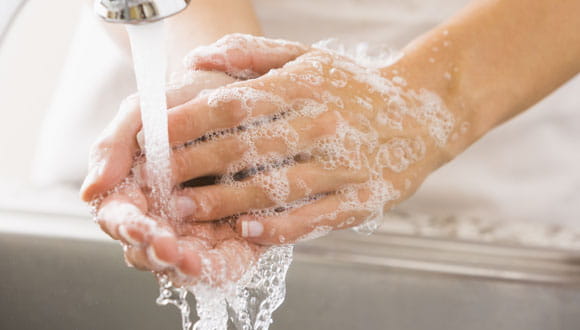Whether it's the voice of a parent, schoolteacher or another authoritative figure, in the back of your mind you can probably still hear someone yelling, "Wash your hands!" But, decades later, you may be surprised at how little you remember about the basics of hand washing, like: why we do it, how we should do it and when we should do it.
While it might sound silly, revisiting proper hand hygiene might be the difference between getting sick and not getting sick — no matter what time of year it is.
Why you should wash your hands
When we think of preventing and fighting infections, we probably think of vaccines, antibiotics and aseptic techniques. But, before all those things existed, there was hand washing.
Germs are everywhere, which means they can also be on your hands. Whether you picked up some germs from a contaminated surface, raw meat or feces from people or animals (oops!), this means you're at risk for developing an infection and spreading an infection to others.
Hand washing is a simple, quick and effective way to remove germs from your hands — preventing infection and illness. In fact, studies have shown that promoting proper hand hygiene within a community reduces:
- Respiratory illnesses, including the common cold
- The number of people sick with diarrhea
- Certain illnesses in at-risk populations (such as those with weakened immune systems)
- The number of children that miss school due to gastrointestinal illnesses
How you should wash your hands
Be honest with yourself for a second and answer this: Did you know there were five steps to proper hand washing?
Surprised there are five? We've got you covered. Here are the five steps you need to take while washing your hands:
- Wet your hands with clean water and apply soap
- Lather both of your hands entirely with soap — this includes between your fingers, under your nails and the backs of your hands
- Scrub your soapy hands while counting to 20
- Rinse your hands
- Dry your hands using a clean towel
Keep in mind, the most common mistakes people make while washing their hands are not scrubbing their hands long enough and not drying their hands completely.
When you should wash your hands
When it comes to when you should consider your hand hygiene, a few of the more obvious times probably to mind. But, just to make sure we're all on the same page, the most important times to wash your hands are:
- After using the bathroom
- Before eating food
- Before, during and after food preparation
- While caring for someone who is sick
- After diaper changing or cleaning up after a child
- After sneezing, coughing or blowing your nose
- After touching an animal, an animal's food (including treats) or an animal's waste
- After handling trash
A quick word on hand sanitizer
There will inevitably come a time when you know you need to wash your hands but soap and water aren't readily available. In these cases, it's okay to turn to hand sanitizer. But, here are a few of the do's and dont's when it comes to using hand sanitizer.
Hand sanitizer do's and don'ts
- Do be sure it contains at least 60% alcohol (check, and then double-check, the label)
- Do apply the correct amount
- Do rub the gel over the entirety of both of your hands
- Do continue rubbing until your hands are completely dry (about 20 seconds)
- Don't use hand sanitizer that contains less than 60% alcohol
- Don't use it as your primary form of hand hygiene
- Don't expect it to work as well if your hands are visibly dirty
- Don't let young children use it unsupervised


